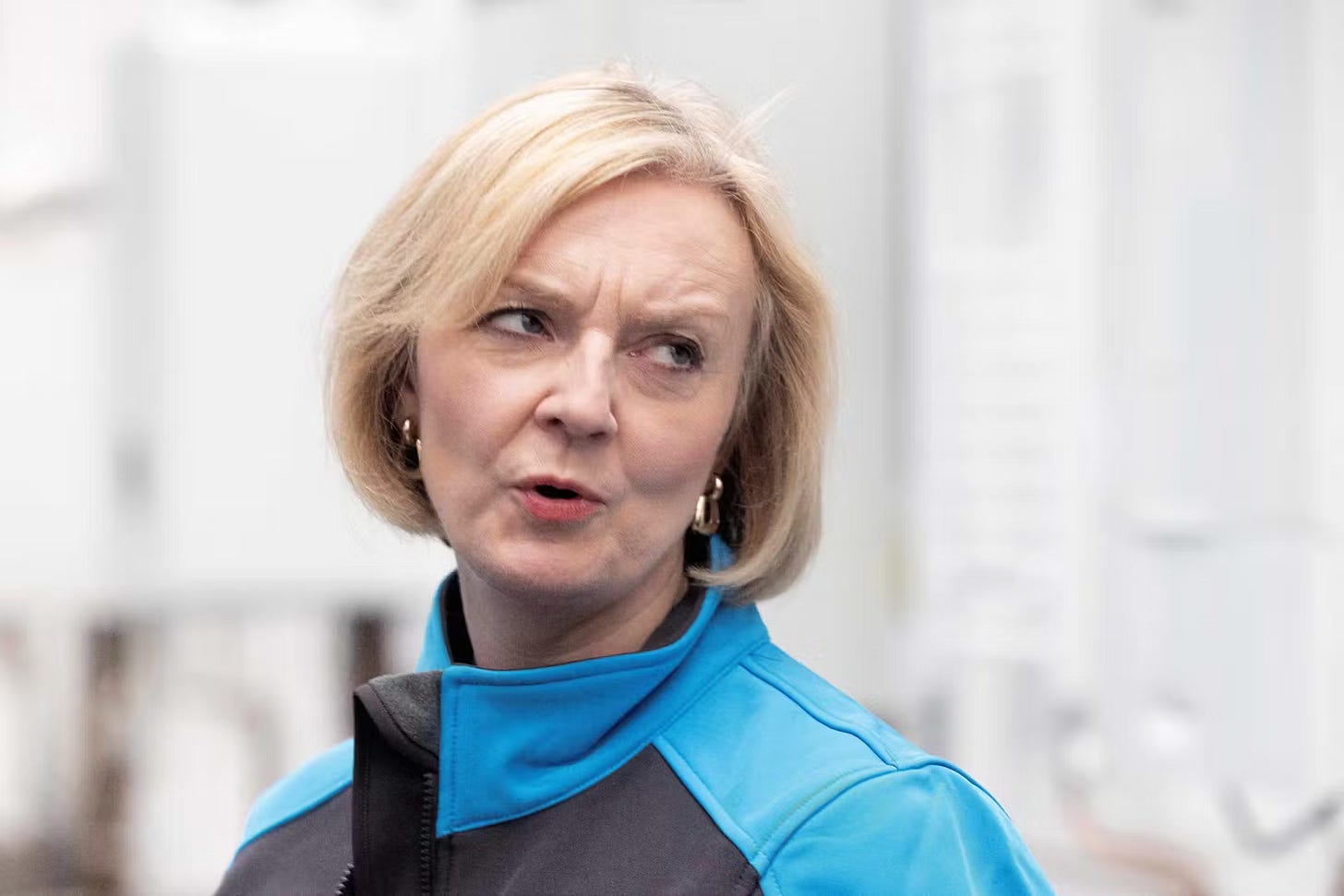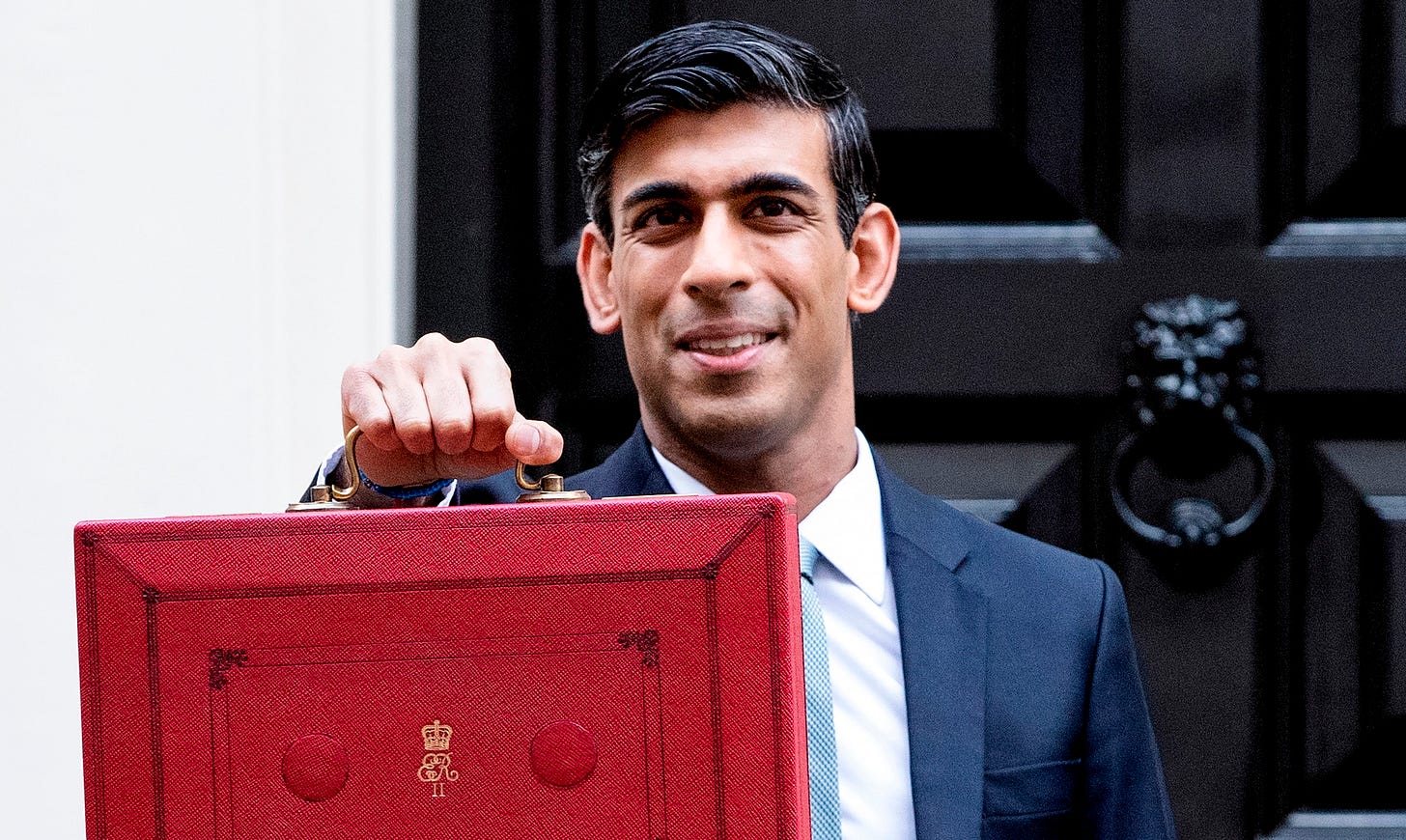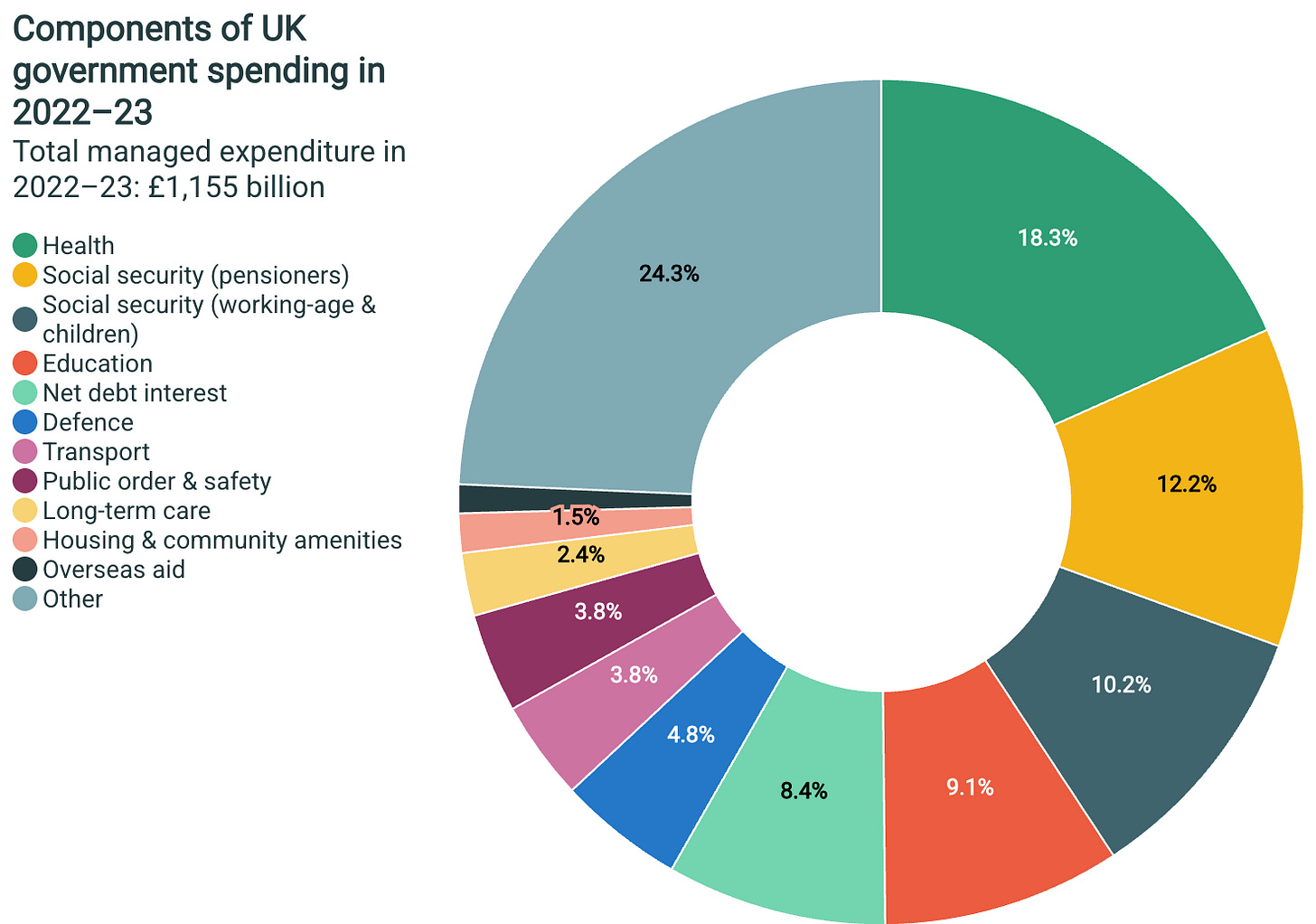23 things Liz Truss got wrong this week
The comeback tour is going well, then
The rehabilitation of Liz Truss is underway. An amalgamation of true-believers and critics in pursuit of ‘balance’ argue that the prime minister for almost all of September and October 2022 had a point about Britain’s chronic low growth, the outsized influence of fiscal forecasts and the need for planning reform.
I don’t even necessarily disagree — though I bristle at the idea that Truss was somehow the first politician who dared to suggest that economic prosperity might be a desirable outcome for policymakers.
With that in mind, I listened (so you don’t have to) to her appearance this week on the buzziest podcast in all of finance, markets and economics: Odd Lots. And on the advice of my doctor, in lieu of downing a shot each time she said something demonstrably false, I wrote it down. Now, you’re going to read about it.
1. Britain is “headed for an IMF bailout”
Even putting to one side whether this is actually true, it is still nonsense. The International Monetary Fund claims to have a lending capacity of roughly $1 trillion, enough to provide packages for mid-sized economies such as Pakistan but not the world’s sixth-largest, with debts of around $3.8 trillion. Furthermore, as the Wall Street Journal’s Joseph C. Sternberg points out in this terrific piece, it is not obvious that the UK’s economic problems are ones for which IMF financial aid would be the solution.
2. The Bank of England was made independent in 1998
It was actually 1997.
3. The Bank “needs to be accountable to politicians”
It already is. The Bank is wholly-owned by the UK government and as a public body is answerable to Parliament, which scrutinises its actions and whether it is meeting its mandate, including the 2% inflation target.
4. Politicians have little control over monetary policy
I have written previously about why this is in fact a Good Thing (it leads to lower interest rates). But for clarity, the Monetary Policy Committee’s four external members are appointed directly by the chancellor of the exchequer, while the Governor is appointed by the monarch on the advice of the prime minister.
5. Truss should have been able to pursue her own policies
She did! But the real reason I included this one is that Truss refers to herself as the “democratically selected leader of the country” which is of course true but hilarious that she wasn’t able to say “democratically elected.”
6. More millionaires have left Britain than any other country in the world per capita
Rich people are leaving the country, but we do not know exactly how many, and the tax specialist Dan Neidle has largely debunked the oft-quoted figures from Henley & Partners.
7. The OBR and Bank of England forced Truss to reverse her mini-Budget
The financial markets, the collapse of sterling and the Conservative Party forced Truss to reverse her mini-Budget.
8. Truss tried to rein in spending
Did she, though? Recall that the markets were not only spooked by the unfunded tax cuts, but also by the energy price guarantee, which was forecast to cost between £72bn and £140bn and which the new chancellor, Jeremy Hunt, was forced to scale back.
9. There were supply-side measures, such as legalising fracking
Support or oppose fracking, at least we can all agree it will make scant difference to bills or energy security. No lesser authority than Kwasi Kwarteng as business secretary acknowledged back in 2022 that “No amount of shale gas from wells across rural England would be enough to lower European prices any time soon."
10. We should compare the size of the mini-Budget with the fiscal packages Rishi Sunak announced during Covid
Oh boy. Sunak’s spending (furlough, business loans, etc.) was in response to a clear emergency — the worst public health and economic shock in living memory. The action taken by the UK government was also in line with global peers. None of this applied to the mini-Budget.
11. The Treasury and Bank of England have a bias towards Keynesianism.
This is the same Treasury that pursued austerity under George Osborne? And the same Bank that raised interest rates in 2022 — even amid weak growth — in order to combat inflation?
12. There is a network, from the IMF to the World Bank and central banks who meet regularly and are too powerful
(((Damn globalists)))
13. Rachel Reeves is taking dictation from the Bank of England
When fiscal and monetary policy are pulling in the same direction, they amplify each other’s effects. For example, in a recession, governments may increase spending and central banks cut interest rates which, in concert, produce a faster recovery. When they work in opposition, they can cancel the other out at best and create dangerous imbalances at worst.
14. The Bank sabotaged the mini-Budget because Truss had been a critic of central banks before she became prime minister
Now we’ve well and truly passed through the looking glass. The Bank in fact intervened to buy long-dated government bonds to stop a pension fund collapse caused by the sudden spike in gilt yields following the mini-Budget.
15. More than 60% of Britain’s budget goes to the NHS and welfare
It’s around 40%, but what’s a few hundred billion pounds between heavily indebted friends?
16. The ‘cult of the NHS’ is wearing thin
The public is deeply unhappy with the state of health and social care, but there is little evidence for Truss’s claim.
17. The left of politics has been “very successful at capturing institutions”
The Conservative Party was in government for around two-thirds of the 20th century, and for 14 of the last 15 years.
18. British politics is “reported as pantomime” rather than an analysis of the issues
Where do they get their material from, Liz?
19. The OBR is not compatible with major reform
The watchdog’s forecasts are important, but it is the choice by successive chancellors to leave precious little headroom below their fiscal rules, that gives the OBR so much of its present ‘influence’.
20. “It is a travesty” that Lucy Connelly was sentenced to 31 months in prison
Connelly, 42, was jailed for stirring up racial hatred following the 2024 Southport attack, after she urged her followers on X to "set fire" to hotels housing asylum seekers.
21. The Attlee government socialised land
I have no idea what this means but Truss is likely referring to The Town and Country Planning Act 1947.
22. “The left of the Conservative Party is still in control of it”
Kemi Badenoch is Tory leader. Robert Jenrick is the favourite to replace her. Michael Heseltine only had the whip restored last year. The party will probably end up with a policy of withdrawing from the European Convention on Human Rights.
23. “There is no evidence that exports to Europe have gone down after Brexit”.
The OBR’s central forecast remains that Brexit will reduce exports and imports of goods and services by 15%, relative to had the UK remained in the EU.
There is, I’m afraid, a serious point to end on. Truss’s central contention is that elected politicians are not really in charge, and that shadowy, unaccountable bureaucrats are, in fact, pulling the strings. This is not true, as Truss herself demonstrated.
But this contention also ignores the fact that we benefit tremendously from independent institutions such as the Bank of England, which provide stability, expertise and long-term planning beyond the political cycle. And in doing so, they make our mortgages cheaper.
This sort of nonsense fuels populism and conspiratorial thinking and delegitimises the democratic process by implying that elections don’t matter. It is up to Keir Starmer to prove her wrong.






You are being too kind to Liz, kinder than she would be to you. Her mini-budget nearly crashed the economy and, if the BoE had not intervened, the Pension Funds would have been bankrupted. That she sacked her chancellor while he was in New York attending some international meeting is just a small indication of how little she was in control of anything. Most politicians knew disaster was imminent when she refused to allow the Budgetary Control Committee to vet her budget (this should have been called out as illegal but no one on the Tory benches even gave it a thought). That the Commons could not force a vote of no confidence (as the SNP had done in 1979 with the Labour government) resulted in two wasted years of Tory incompetence.